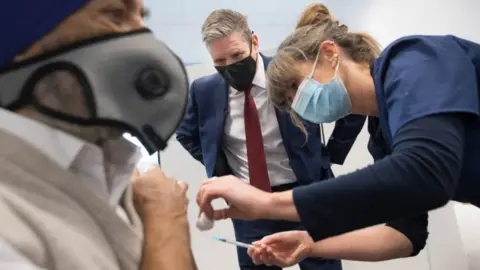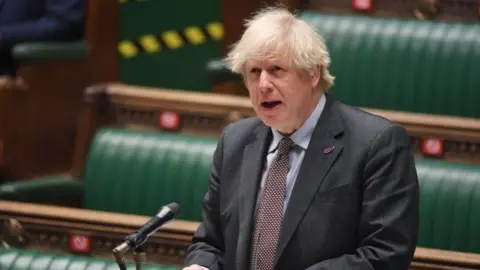Covid: Sir Keir Starmer's vaccine stance shot by both sides
 PA Media
PA MediaThis week Sir Keir Starmer answered some of his internal Labour critics by producing what looked suspiciously like a policy - a call to vaccinate teachers at half-term. How was it received and what lessons can the party learn from it?
Since his election as Labour leader last April, Sir Keir has been keener to emphasise his party's - and indeed his own - values than produce a raft of specific policies potentially four years before the next general election.
And with Labour under new leadership, he has been at pains to establish a reputation for competence, and contrast this with a government apparently struggling to cope with the manifold challenges of the coronavirus crisis.
For some in his party, he has been too cautious.
On Thursday night, Jon Trickett - who was sacked from the shadow cabinet when Sir Keir became leader - criticised his approach in a social media missive: "The idea that the job of opposition at the moment is to focus exclusively on Tory mismanagement and incompetence - it's a mistake. It's not a big enough issue."
But this week the Labour leader's adoption of a bolder position on the pandemic - creating clear blue water between Labour and the government - was not an unalloyed success.
Politically, there were positives - but potential dangers in the approach also became apparent.
'Resonates with voters'
Sir Keir initially put Boris Johnson on the back foot at Prime Minster's Questions on Wednesday when he called for the vaccination of all school staff in England during the February half-term, after the four most vulnerable groups are scheduled to be inoculated.
This was very much in line with the sort of advice his now policy chief Claire Ainsley dispensed in her 2018 book The New Working Class.
"Policy strategists need to think less about how they go about selling particular policies … and more about how they tell a story about who the party is that resonates with the voters," wrote Ms Ainsley.
"Policies then become part of that story, rather than the story in and of itself."
So this "policy" - or, in truth, demand - told us a story about Sir Keir's priorities: to get schools fully open, as he - like parents - values children's education and to look after the interests of key public sector workers on the frontline.
It was also intended to suggest Labour had a plan for fully opening schools in contrast with a prime minister hoping for the best.
And it appeared to have some resonance.
Breaking with the science?
An IPSOS MORI poll suggested 46% of the public would want to see teachers and nursery staff vaccinated ahead of "healthy" people in their 60s - and nearly half a million people have signed a petition calling for teachers to be on a priority list for the vaccination.
And there seemed to be something of an endorsement for Sir Keir's position from Conservative former cabinet minister Esther McVey, when she said: "If vaccinating teachers, after the most vulnerable in society, removes the barriers to reopening schools then we should do it."
So far, for Keir Starmer, so good.
But, after PMQs on Wednesday, the prime minister returned to the topic better armed, during a subsequent Commons statement on the pandemic.
This time, he attacked the opposition leader for apparently breaking with scientific advice.
 Jessica Taylor/UK Parliament
Jessica Taylor/UK Parliament"The JCVI (priority) list is designed by experts, by clinicians, to priorities those groups who are most likely to die or to suffer from coronavirus," said the PM.
"By trying to change that and saying he wants now to bring in other groups - to be decided by politicians rather than the JCVI - he has to explain which vaccines he would take from which vulnerable groups."
Media grilling
Sir Keir had, perhaps, been on stronger ground when, having consulted minutes from the scientific advisory body SAGE, he had called for an earlier lockdown - or "circuit breaker" - in the autumn of 2020, accusing the government of not following the science. Now he had the same charge thrown back at him.
The other difficulty he had was that a simple demand for vaccination was anything but.
 PA Media
PA MediaThe full Labour position was that school staff be vaccinated "alongside" priority groups 5-9, the 50-69 year olds- and was posited on more supplies of the vaccines becoming available, and more sites - such as pharmacies - dispensing them.
But a range of Labour frontbenchers were subjected to media questioning which adopted the PM's assumptions - if you are going to add teachers under 50 to a priority list, who amongst the over 50s would have to wait longer for a jab?
This question - in various guises - was answered with varying degrees of clarity.
Labour's deputy leader Angela Rayner - on Thursday's Today programme - strayed in to potentially risky territory for the party.
Keir Starmer's argument was that education would be interrupted if school staff had to self isolate regularly, so best to jab them when key-worker school is out next month.
'More at risk'
But under sustained questioning Ms Rayner also justified the vaccination demand on the grounds of safety - and in the process appeared to clash with scientific advice that Labour had once lionised.
She said that Office for National Statistics data showed that all frontline key workers, including teachers, are "more at risk of infection and death - that's a fact".
In fact the Office for National Statistics found that 52 secondary school teachers died between March and December last year, equating to a death rate of 39.2 deaths per 100,000 men and 21.2 deaths per 100,000 women.
It is true that these rates were higher than than the figures for the UK population as a whole, which were 31.4 and 16.8 deaths per 100,000 among men and women respectively.
But the ONS said these differences "were not statistically significantly different than those of the same age and sex in the wider population".
As for the death rates overall among teaching staff - 18.4 deaths per 100,000 men and 9.8 deaths per 100,000 women - the ONS said these were "statistically significantly lower than the rate of death involving Covid-19 among those of the same age and sex".
And England's deputy chief medical officer Jonathan Van-Tam has said that teachers are not "markedly" more likely than other people to coronavirus or die from it.
Drakeford's stance
And there is one other question opponents would throw at Sir Keir Starmer: Would you really do in government what you are calling for in opposition?
The one part of the UK which has a Labour-led administration is Wales.
So the party could put in to practice what the UK party leadership is advocating.
Yet, despite a probable earlier return to the classroom for children in Wales than in England, the first minister Mark Drakeford sounded less gung-ho about jabbing teachers in February than Sir Keir.
When publishing the schedule of vaccinations, his administration made clear that they "could set aside the recommended priority approach of the JCVI" but "such an approach is likely to cost lives".
And today Mr Drakeford told BBC Radio 5 Live he would vaccinate teachers as a priority - but only if the JCVI advised him to do so: 'We follow the advice of our expert committee. That's what you have to do when you're in government."
Labour leadership sources insist that Sir Keir's call for vaccination was, of course, also dependent on the JCVI agreeing to include teachers in the next priority list.
Lessons to learn?
His intervention was designed to influence, not to overrule - to urge the committee to look at the impact on society, as well as health.
So, at worst, they would concede that if there were a difference between Westminster and Wales, it was only in tone and not in substance.
So what lessons can Labour learn from this week for any future?
Probably the importance of singing from the same song sheet.
Angela Rayner added some lyrics of her own, which created some disharmony, and the Welsh leader's voice sounded a bit muffled.
Had Mark Drakeford said that he - just like Sir Keir - would be pressing the JCVI to consider vaccinating, but ultimately would follow their advice, then any difference in tone might have been undetectable to the political ear.
'Cut through'
So perhaps messaging rather than the message itself is what really required more work.
That said, the JCVI is expected to look at the next priority groups for vaccination some time next month.
The head of the NHS in England, Sir Simon Stevens, told a committee of MPs this week that there was a 'legitimate discussion' for the JCVI to have on whether "certain key public service workers, teachers, the police" should also have priority.
And at that stage - if the JCVI were to push teachers up the pecking order - then Sir Keir's intervention would seem prescient, and the slightly bumpy delivery of a distinctive policy position would be forgotten.
Labour's strategists know how difficult it is to "cut through" in a crisis when government action - or lack of it - will almost always dominate the headlines.
So perhaps there is a recognition that criticising the slowness of the government response will have to be more regularly augmented by ideas of their own.
But they will know now - if they didn't before - that this leaves them open to counter-attack, and significant scrutiny.
